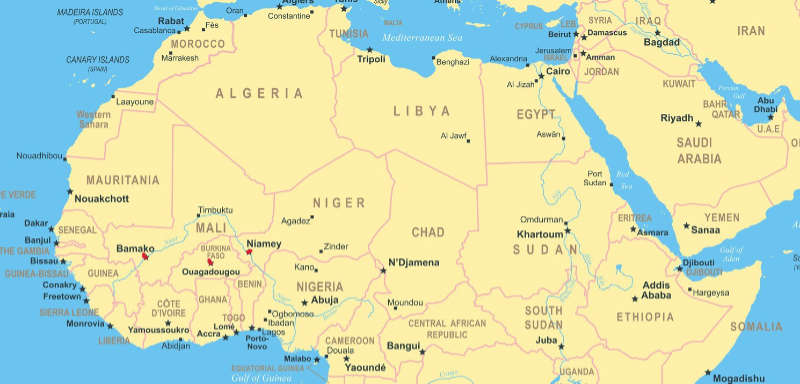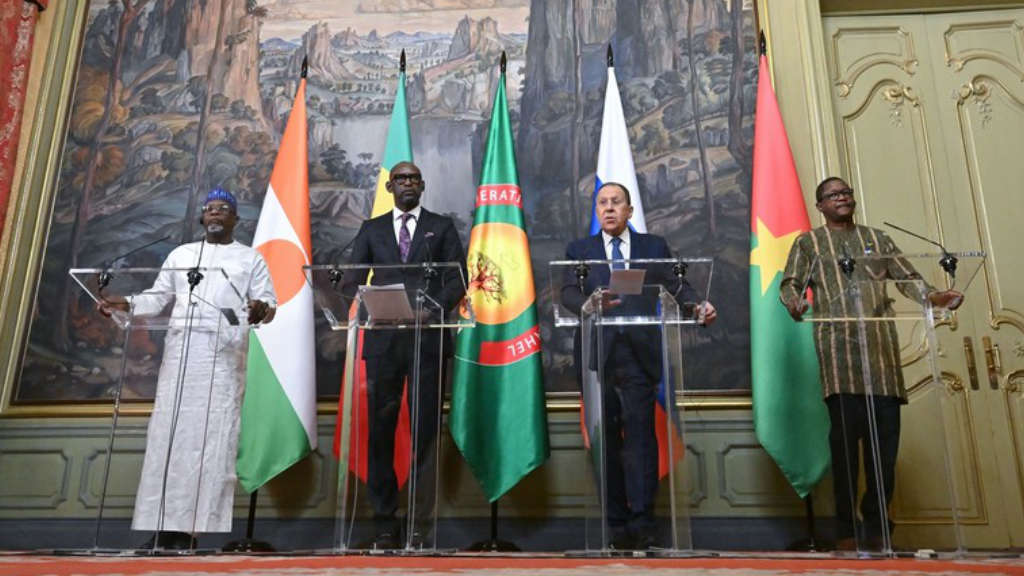The Russian Foreign Minister Sergey Lavrov has been holding collective meetings with the Foreign Ministers of Burkina Faso, Mali and Niger in Moscow. The three countries are part of the new Alliance of Sahel States (AES) which became operational in January this year as the three nations resigned from their membership of the Economic Community of West African States (ECOWAS), which also includes Benin, Cabo Verde, Cote d’Ivoire, The Gambia, Ghana, Guinea, Guinea-Bissau, Liberia, Nigeria, Senegal, Sierra Leone, and Togo.
Speaking after the Moscow meetings, Lavrov stated that Russia is prepared “to actively assist in building the capacity of the joint forces of the Sahel states, enhancing their combat readiness, as well as that of the national armed forces of each of the three countries, and in training military personnel and law enforcement officers.”
Lavrov said that the creation of a unified armed force for the three Sahel nations would be in addition to existing bilateral efforts to enhance defence cooperation and added that Russian assistance would involve support for the Alliance’s broader strategic priorities, including economic development and diplomatic processes.
Malian Foreign Minister Abdoulaye Diop thanked Russia for “Supporting us in the difficult moments of our story. We know that friends can be found in distress. Many thanks for your solidarity” and also announced that the Malian interim president, General Assimi Goita, will visit Moscow in June.
Niger’s foreign minister, Bakari Yaou Sangare, emphasized that the AES looks to Russia for assistance in securing arms supplies, noting that the Alliance faces an increasingly difficult global environment. “The people of the Sahel are counting on Russia. They ask Russia to stand by us and support us in our fight against terrorism and in our struggle for independence.”
Burkina Faso’s Foreign Minister, Karamoko Jean-Marie Traore, said that “Russia has reaffirmed its readiness to continue providing multifaceted assistance to Burkina Faso, including in ensuring national security and solving social and economic problems.”

Background
These three countries – Burkina Faso, Mali and Niger collectively known as the Sahel, are all currently under military rule following Islamic unrest with military coups being held over the past two years in each to prevent further collapse into war. The underlying reasons for this lie with France, who colonised these nations in the 1920’s. Niger in particular has been important to Paris as it has provided up to 85% of France’s Uranium, required to power France’s nuclear energy programme. Niger and Mali also both have considerable other mineral reserves, including significant deposits of gold, coal, iron ore, tin, oil, phosphates, molybdenum, bauxite, phosphates, lithium and manganese. Mali is also a significant gold and cotton producer, while Burkina Faso is more reliant on its agricultural industry.
These countries have all downgraded diplomatic ties with France, accusing Paris of imposing unfair contracts upon them, and requesting the French military presence leave. Paris meanwhile has reacted by arming and financing Islamic militants in the region to provoke further unrest. That is designed to see the military junta’s overthrown in order to have more Paris-friendly governments in power.
France’s needs have also stoked tensions in other directions. Mali and Niger have also severed diplomatic ties with Ukraine and labelled it a sponsor of state terrorism after they found French weapons had been smuggled in from Ukraine to support the Islamic insurgents. Kiev has described the accusations as ‘baseless’.
The AES nations also left the ECOWAS trade bloc in January this year, also describing it as too French influenced. That has some implications for regional trade, as the ECOWAS trade bloc is powerful with a GDP PPP of about US$1.5 trillion representing a significant regional market of about 387 million. However, Burkina Faso, Mali and Niger are also all members of the African Continental Free Trade Agreement (AfCFTA), which also includes all ECOWAS countries, meaning trade damage should be minimal.
Reaction
Russia has long-standing diplomatic relations with the Sahel countries, and have trade and investment interests in developing these, not least because a pivot to Moscow from Paris can provide Russia with access to significant mineral assets in Africa. For this reason, maintaining the current military juntas in the Sahel is to Moscow’s advantage, although significant investment on Russia’s part will also be required. That however can be secured against regional mineral reserves.
The initial step however is to provide and upgrade security in the Sahel. Russia has already provided communication satellites to each of these countries to better assist with security issues. In addition to this, Moscow has also committed to military training and supplies to these countries and is working out with them how to better combine their resources into a combined Sahel military force. At present, the Russian Africa Corps (previously the Wagner Group) is working on the ground to help secure the region. The Africa Corps are frequently described in Western media as ‘mercenaries’, which was partially true during its Wagner days, although the same description could also be applied to the French Foreign Legion. However, since the death of Yevgeny Prigozhin, the Wagner Group militia have been absorbed into the Russian Army.

Other issues relate to geographic territory and logistics problems as the Sahel nations are all landlocked. For this reason, Russia’s diplomatic relations elsewhere in West Africa are also important to eventually provide both Atlantic Ocean and Mediterranean Sea access for the Sahel. The obvious routes for this are west via Mauritania or north via Libya with the latter already possessing a Russian navy base. However, while both these countries are Russia-friendly, Mauritania lacks infrastructure and has Islamic insurgents while Libya is similar and is still recovering from war. The opinions of a powerful ally in Morocco also need to be taken into consideration. However, the die is being cast – can Russia prevail and succeed in the Sahel where France has ultimately failed?
Further Reading

 Русский
Русский














